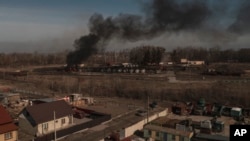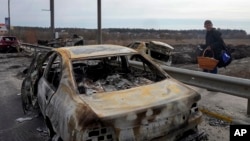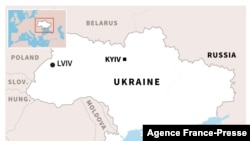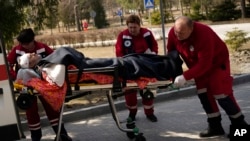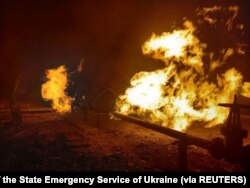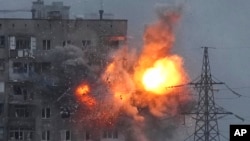One of Ukraine’s biggest military training bases, located 25 kilometers from the Polish border in the west of the country, was struck by Russian missiles in an attack that left 35 people dead and 134 others injured, according to Ukrainian officials.
The base at Yavoriv is only 60 kilometers from Lviv, a major hub for Ukrainian evacuees heading into Poland. It has also been used by NATO military instructors, but Ukrainian officials say they are still trying to establish whether any were on-site for the attack and were injured.
The strike on the International Center for Peacekeeping and Security is the westernmost attack by Russia so far and increases fears that Lviv may soon be embroiled in the conflict. More than a week ago VOA reported U.S. intelligence agencies feared Belarus, Russia’s ally and a staging ground for the Russian invasion of its neighbor, might throw its troops into the war, and would launch attacks on Ukraine’s north-west and center, endangering Lviv. So far Belarus has not entered the conflict directly and the attack on the training center was a Russian strike. But American and European officials remain worried about Belarus.
That aside, the intelligence assessment was that Lviv should not be considered safe ground. Messages sent to NGOs and projects funded by the United States and drawn from the intelligence assessment warned: “Cities in the West are no longer regarded as safe.” NGO workers still inside Ukraine were advised to leave Lviv and seek shelter in border villages, less likely to be targeted by missiles.
The local governor of the Lviv region said 30 missiles hit the military training facility. But central government officials estimated eight missiles struck the base. “The occupiers launched an airstrike on the International Center for Peacekeeping and Security. According to preliminary data, they fired eight missiles,” Anton Mironovich, spokesman for the Ukrainian Armed Forces, told the Interfax Ukraine news agency.
The targeting of Yavoriv is being seen by some Western diplomats as a message reinforcing a warning issued Saturday by Russia’s deputy foreign minister Sergei Ryabkov, who said western arms convoys to Ukraine were now considered by Moscow a “legitimate military target.”
There has been an uptick in recent days in Russian airstrikes targeting military facilities in western Ukraine. Last week on air-defense facilities and military airfields in western Ukraine, around 130 kilometers south of Lviv.
Russian Defense Ministry spokesman Igor Konashenkov said Friday that Russian forces had carried out long-range missile attacks on two military airfields in the western Ukrainian cities of Lutsk and Ivano Frankivsk. Ukrainian military officials confirmed the strikes but denied Russian claims that the air-defense facilities at both airfields had been destroyed. Local authorities said two Ukrainian servicemen were killed and six people wounded at the Lutsk military airfield.
Russian forces struck the airbase at Ivano-Frankivsk again Sunday morning. The city’s mayor, Ruslan Martsinkiv, has urged people living near the base to leave.
Ukraine's defense minister dubbed the Russia's airstrike on Yavoriv a “terrorist attack.” Oleksii Reznikov tweeted: “Russia has attacked the International Center for Peacekeeping&Security near Lviv. Foreign instructors work here. Information about the victims is being clarified. This is new terrorist attack on peace&security near the EU-NATO border. Action must be taken to stop this. Close the sky!”
The attack so close to the Polish border is alarming European politicians. Norbert Röttgen, a senior German politician and former chair of the German parliament's foreign affairs committee, tweeted: "Attacks on #Lviv for the first time. The city in western #Ukraine is closer to Berlin than Berlin is to Paris. This war will get worse, it will get closer. In order to restore peace in Europe, we must do more, namely everything we can. Waiting is no longer acceptable!"
Ukraine has been intensifying its call for NATO to establish a no-fly zone over the country, something western leaders have repeatedly rejected on the grounds it could result in alliance warplanes shooting down Russian jets, triggering a broader European war, risking a nuclear exchange.
Ukrainian President Volodymyr Zelenskyy accused NATO’s leadership of giving the “green light for further bombing of Ukrainian cities” by declining establish a no-fly zone over Ukraine, saying those who oppose the move bear responsibility for civilian deaths going forward. But some military experts are skeptical a no-fly zone could work, pointing out that it would do little to stop the missile strikes, which are causing most of the destruction.
Damir Marusic, an analyst at the Atlantic Council, a New York-based think tank, says that to impose an effective no-fly zone and to protect patrolling NATO warplanes, the western alliance would have to take out anti-aircraft batteries based in Belarus and Russia, otherwise there would a constant risk of NATO aircraft being downed.
Meanwhile, as worries mount about whether western Ukraine will start becoming more of a target, in the east of the country the regional governor of Donetsk, Pavlo Kyrylenko, told Ukrainian television that the town of Volnovakha, now in Russian hands, had been effectively wiped out.
“In general, with its infrastructure as such no longer exists,” he told the Ukrainian television channel Direct. Volnovakha endured days of heavy bombardment demolishing the town of 21,000 people. Videos posted on social media show Russian armored vehicles in the center of the burnt-out town. Volnovakha had the misfortune of being located in a militarily important position, lying between the city of Donetsk, held by pro-Moscow separatists, and the still-controlled Ukrainian port of Mariupol, on the Sea of Azov.
Mariupol has been besieged for 11 days.
Russian forces also damaged Saturday the Sviatohirsk Lavra, a major Orthodox Christian monastery and pilgrimage site on the bank of the Seversky Donets River near the town of Sviatohirsk. At the time of attack, around 520 civilians and monks were at the site, Ukrainian media have reported.
In a video address from Kyiv Saturday President Zelenskyy accused Russia of waging a “war of annihilation” against Ukraine.




